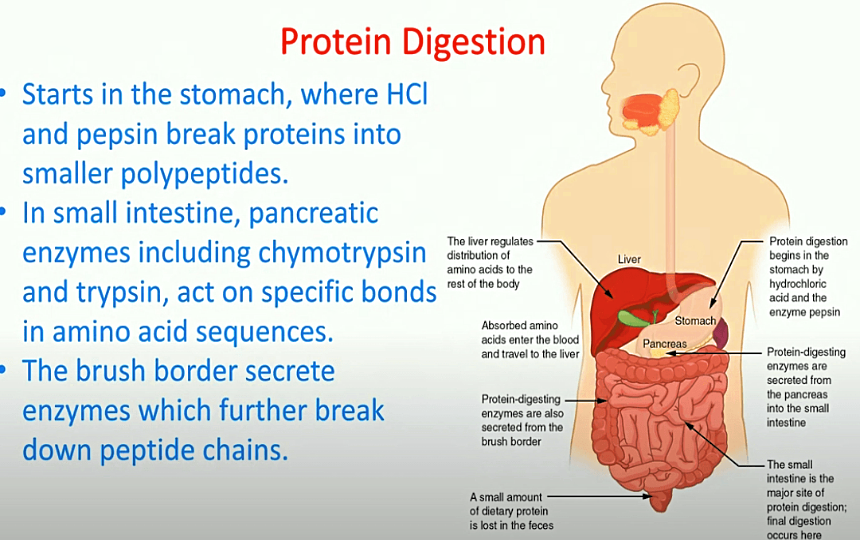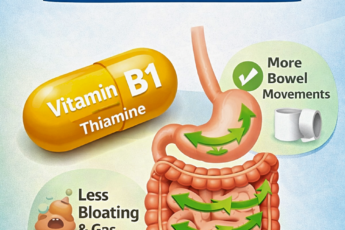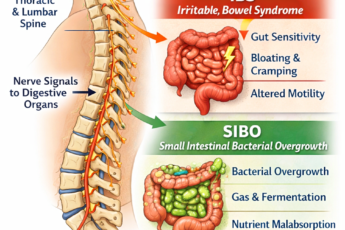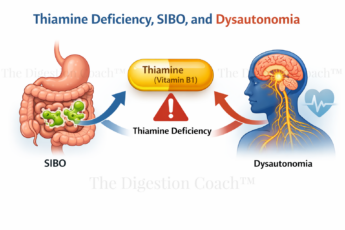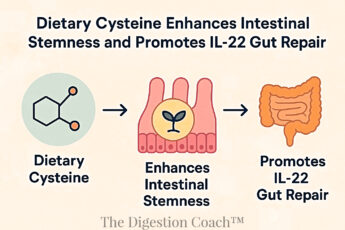Table of Contents
- 1. What is Pepsin and its Role in Protein Digestion?
- 2. Pancreatic Enzymes: Trypsin, Chymotrypsin, and Pancreatin
- 3. Brush Border Enzymes and Final Breakdown
- 4. Impact of SIBO on Protein Digestion
- 5. Nutritional Supplementation to Support Digestion
- 6. Addressing SIBO Directly
- 7. Conclusion
The Role of Enzymes and Nutrients in Protein Digestion: How SIBO Impacts the Process and Potential Solutions
Protein digestion is a complex process involving multiple organs, enzymes, and co-factors that work together to break down dietary proteins into absorbable amino acids. When functioning optimally, these systems ensure that proteins are properly digested and assimilated by the body. However, conditions like Small Intestinal Bacterial Overgrowth (SIBO) can disrupt protein digestion, leading to malabsorption and nutrient deficiencies. Understanding the key players in protein digestion and how SIBO interferes with them can help us identify potential solutions, including nutritional supplementation and digestive aids.
1. What is Pepsin and its Role in Protein Digestion?
The first stage of protein digestion occurs in the stomach, where pepsin, an enzyme responsible for breaking down proteins, plays a critical role. Pepsin is secreted by chief cells in the stomach as its inactive precursor, pepsinogen. Pepsinogen is activated into pepsin by hydrochloric acid (HCl), secreted by parietal cells in the stomach.
- HCl creates the highly acidic environment needed to activate pepsin and start the breakdown of proteins into smaller peptides.
- Pepsin is effective only in the acidic environment provided by HCl, making the presence of stomach acid essential for protein digestion.
Digestion Coach Pro Tip: In conditions of low stomach acid (hypochlorhydria), the activation of pepsin is impaired, leading to incomplete protein digestion. Until this mechanism can be restored, utilizing a mineral-rich sea salt like Baja Gold Sea Salt and taking a digestive enzyme that contains pancreatin, betaine HCl, and pepsin before meals will help support proper protein digestion.
2. Pancreatic Enzymes: Trypsin, Chymotrypsin, and Pancreatin
After partially digested proteins leave the stomach, they enter the small intestine, where pancreatic enzymes take over digestion. The pancreas secretes trypsinogen and chymotrypsinogen, the inactive forms of trypsin and chymotrypsin, into the small intestine. Enteropeptidase, an enzyme produced in the small intestine, activates these.
- Trypsin and chymotrypsin further break down proteins into smaller peptides.
- Pancreatin, a combination of digestive enzymes including proteases, lipase, and amylase, is also secreted by the pancreas to assist in the digestion of proteins, fats, and carbohydrates.
These enzymes work optimally in the small intestine’s slightly alkaline environment, which is maintained by the pancreas’s secretion of bicarbonate.
3. Brush Border Enzymes and Final Breakdown
The final step of protein digestion occurs at the brush border of the small intestine, where enzymes like dipeptidases and aminopeptidases break down the smaller peptides into individual amino acids. The intestinal lining then absorbs these amino acids and transports them into the bloodstream.
4. How SIBO Impacts Protein Digestion
- The overgrowth of bacteria in the small intestine can consume protein before it is fully digested and absorbed. These bacteria may break down proteins into toxic byproducts, such as ammonia, which can further irritate the gut lining.
- Excessive bacteria can also interfere with the normal function of brush border enzymes like aminopeptidases. These enzymes are necessary for the final breakdown of peptides into absorbable amino acids. This reduces the efficiency of protein metabolism and can lead to malabsorption.
- Uninvited Guests: The Impact of Small Intestinal Bacterial Overgrowth on Nutritional Status
A. Inflammation and Damage to the Intestinal Lining:
- Chronic SIBO can cause inflammation and damage to the intestinal mucosa, impairing the absorption of nutrients, including amino acids. This damage can also affect the functioning of the brush border enzymes, further disrupting protein digestion. This process can cause a leaky gut.
B. Inhibition of Pancreatic Enzyme Secretion:
- Chronic SIBO may lead to inflammation that extends to the pancreas, potentially impacting the acinar cells, which produce digestive enzymes like trypsin and chymotrypsin.
- Persistent dysbiosis and inflammation in the small intestine can also disrupt the standard feedback mechanisms that stimulate the pancreas to secrete its enzymes. Over time, this can result in pancreatic insufficiency, where enzyme production is reduced, further impairing protein digestion.
C. Altered Bile and Digestive Enzyme Function:
- The excess bacteria in SIBO may deconjugate bile acids, reducing bile’s ability to emulsify fats and impair fat digestion. Bile also plays a role in stimulating enzyme release from the pancreas, and this disruption may further reduce the secretion of acinar cell enzymes needed for the proper digestion of proteins and fats.
5. Nutritional Supplementation to Support Digestion
A combination of nutritional supplementation and digestive aids can be highly beneficial in addressing the digestive issues caused by SIBO and its impact on protein metabolism. These supplements can help restore the enzymes and acids that are either deficient or not functioning correctly due to SIBO.
A. Pepsin and HCl Supplementation
Supplementing with Betaine HCl and pepsin can help restore the stomach’s acidic environment, ensuring that proteins are properly broken down. This is particularly useful for individuals with low stomach acid (a common issue in SIBO) and helps improve protein digestion from the very beginning of the process.
- Betaine HCl supports stomach acidity, while pepsin aids in the breakdown of proteins into smaller peptides, reducing the protein load on the small intestine.
B. Pancreatic Enzyme Supplementation: Trypsin, Chymotrypsin, and Pancreatin
For those with compromised pancreatic function, supplementing with pancreatin, which contains a mixture of proteases (trypsin and chymotrypsin), amylase, and lipase, can significantly improve digestion of proteins, fats, and carbohydrates. These enzymes take over where the body’s natural enzyme production is insufficient, ensuring that proteins are fully broken down into absorbable amino acids.
C. Bile Salts
Supplementing with bile salts (such as ox bile) can aid in emulsifying and digestion of fats, which is often impaired in individuals with SIBO due to bacterial interference with bile acid metabolism. This supports fat digestion and enhances the absorption of fat-soluble vitamins and nutrients.
D. Are There Nutritional Supplements That Will Support Digestion?
Several digestive enzyme supplements are available, containing various combinations of HCl, pepsin, trypsin, chymotrypsin, pancreatin, and bile salts. These comprehensive digestive aids are designed to support multiple stages of digestion, making them particularly useful for individuals with SIBO or compromised enzyme production.
Some examples include:
- Wobenzyme N: THE CLINICALLY STUDIED FORMULA: First introduced in Germany over 40 years ago, the Wobenzym N formula includes pancreatin protease, papain, bromelain, trypsin, chymotrypsin, rutoside trihydrate.
- NOW FOODS Super Enzymes: A blend of digestive enzymes including HCl, pepsin, pancreatin, ox bile, and additional enzymes like bromelain and papain.
These supplements can help restore optimal digestion in individuals suffering from SIBO-related enzyme insufficiencies and support the body’s ability to metabolize fats, proteins, and sugars properly.
6. Addressing SIBO Directly
While supplementation helps manage the symptoms of protein malabsorption and digestive issues, addressing the root cause—SIBO—is critical. This is where having a gut health specialist like myself comes in handy. Knowing what to give and when and knowing a patient’s individual needs only comes with experience. Treatment may include:
- Antimicrobial and/or antibiotic therapy to reduce bacterial overgrowth.
- Dietary changes involve reducing fermentable carbohydrates (following a low-FODMAP diet) to minimize bacterial feeding.
- Probiotics to restore healthy gut flora and reduce dysbiosis.
- Working with a SIBO Specialist who understands SIBO from Cause to Cure.
7. Conclusion
Protein digestion is a multi-step process requiring coordinated effort from various enzymes and co-factors. When the digestive system is compromised by conditions like SIBO, the body’s ability to break down and absorb proteins can be severely impaired. The resulting malabsorption can lead to nutrient deficiencies, chronic digestive issues, and inflammation. However, the use of nutritional supplementation and digestive aids—such as pepsin, HCl, trypsin, chymotrypsin, pancreatin, and bile salts—can help offset these deficiencies, restore proper digestion, and alleviate the symptoms associated with SIBO.
COMPLEMENTARY 15-MINUTE CALL
Take your first step toward a renewed sense of well-being. Call today to arrange a complimentary 15-minute consultation.
Let’s discern whether my approach aligns with your needs.
I look forward to connecting with you at 714-639-4360.
